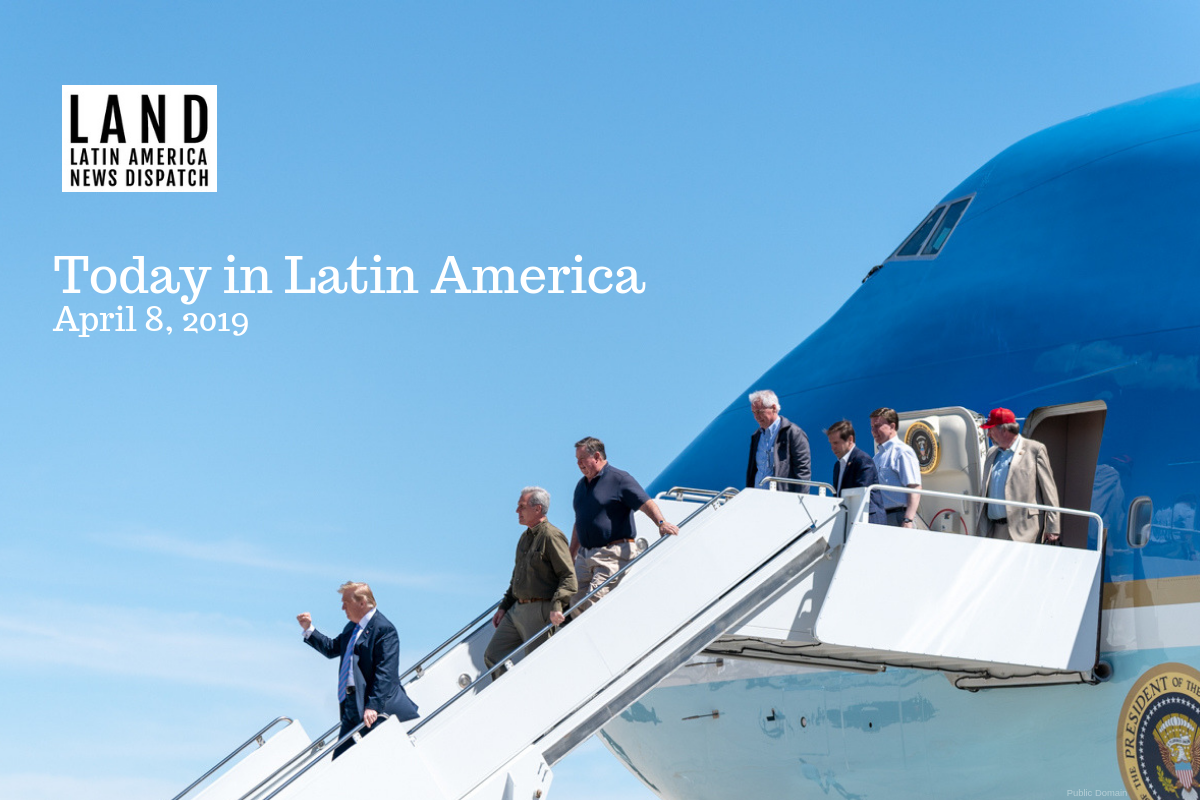

President Donald J. Trump arrives aboard Air Force One to Naval Air Facility El Centro, Calif., Friday, April 5, 2019, to visit the border in Calexico, Calif. (Official White House Photo by Shealah Craighead/Public Domain)
UNITED STATES: President Donald Trump visited the southern border near the California town of Calexico on Friday. At a roundtable event, Trump expressed his concerned over the upsurge in illegal crossings, declaring that the “country is full” so migrants should “turn around.” The visit followed a week of tariff threats against Mexico and foreign aid cuts to Central American countries. California and 19 other states are suing the Trump administration over his emergency declaration to build a border wall.
The Trump administration is seeking to drive border security agencies in a “tougher direction,” according to a statement from the White House. Yesterday, Kirstjen Nielsen announced her departure from the Department of Homeland Security (DHS). As DHS Secretary, Nielsen’s tenure became the object of Trump’s criticism for her leniency towards immigration control, despite enacting “zero tolerance” policies at the southern border. Kevin McAleenan, Customs and Border Protection Commissioner, will serve as acting DHS secretary.
HEADLINES FROM THE WESTERN HEMISPHERE
NORTH AMERICA
MEXICO: Former Mexican President Vicente Fox said Saturday that armed men tried to “storm into his house.” The reported incident occurred just four months after current president Andrés Manuel López Obrador cut off security services for former presidents. Fox, who was the president from 2000 to 2006, made the announcement via Twitter, saying that he holds the president “directly responsible” for his family’s security.
Esta mañana un comando armado pretendió entrar a mi casa . Es una situación grave y que requiere inmediata atenció
Hago directamente responsable de la seguridad de mi Persona, de mi Familia y de mis Bienes al presidente Andrés Manoel Iopez Obrador.
Ex Ppresidente Vicente Fox Q.— Vicente Fox Quesada (@VicenteFoxQue) April 6, 2019
Yesterday, López Obrador announced new security measures to protect former presidents, including Fox and Felipe Calderón, in office between 2006 to 2012.
MEXICO: Massive power outages hit Mexico’s Yucatán Peninsula on Friday night. The states of Quintana Roo, Campeche and Yucatán had a two-hour interruption in their electrical services caused by a fire in Mérida, the capital city of Yucatán. The Federal Electrical Commission stated via Twitter that power was restored to the three Mexican provinces early Saturday.
?#Boletín: Incendio por la quema de plantaciones de caña provoca interrupción del suministro de energía eléctrica en Q. Roo, Campeche y Yucatán; servicio fue restablecido en su totalidad https://t.co/mOgPVqUkeO pic.twitter.com/ZbnRkiKwHt
— CFEmx (@CFEmx) April 6, 2019
Over 400,000 households are said to have been affected.
THE CARIBBEAN
CUBA: On Sunday, over 400 animal lovers marched through Havana in a government-approved demonstration organized by Cubans in Defense of Animals. Unprecedented since the start of the country’s revolution in 1959, the socialist government allowed the animal-rights march to take place under surveillance of a few dozen state security agents. While some Cubans are optimistic about the government’s decision, most state-run media purposely failed to cover the events. Volunteers from the government-endorsed animal group also boycotted the march and plan to organize their own march for the same cause next week. Cuba currently does not have an animal-protection law, but animal groups continue to ask for it.
CENTRAL AMERICA
PANAMA: President Juan Carlos Varela wrapped up his final presidential trip to Japan on Saturday. Varela met with Japanese Prime Minister Shinzo Abe in Tokyo last Thursday to discuss the progress of the Panama Metro Line 3 project, which Japan is helping construct using their monorail technology. Varela believes the ties between Panama and Japan will serve as an example to neighboring countries, while it also helps to promote the implementation of Japanese technology in Latin America.
NICARAGUA: On Friday, 50 political prisoners were released and given house arrest in Nicaragua. The opposition, known as the Civic Alliance, calculates that over 600 protesters of President Daniel Ortega’s regime remain imprisoned. The Inter-American Court of Human Rights demanded the Nicaraguan regime to release the full list of detainees. Large demonstrations against the government was carried out on Saturday in various parts of the country.
THE ANDES
VENEZUELA: Large rival protests were held on Saturday as Venezuela braced for an intensified geopolitical showdown. As self-declared president and opposition leader Juan Guaidó called for nationwide mass demonstrations under the name “Operation Freedom,” incumbent Nicolás Maduro convened a “revolutionary mobilization” in Caracas the same day.
¡ATENCIÓN! ✌?
Este 06 de abril las calles de Venezuela se desbordarán de amor y alegría… Las fuerzas revolucionarias se movilizan en respaldo a la Revolución Bolivariana y al presidente @NicolasMaduro#ElQueEntendioEntendio #PuebloEnMáximaResistencia @dcabellor pic.twitter.com/xFuTgf7SEA
— PSUV (@PartidoPSUV) April 2, 2019
Meanwhile, the United States imposed new sanctions on Venezuelan oil and called for Russian personnel to leave the South American country. The U.S. will now be represented by Switzerland in further de-escalation efforts, after Caracas broke diplomatic relations with Washington on Friday.
PERU: Paleontologists found the fossil of an ancient four-legged whale on the coast of Peru near Playas Media Luna. The 43-million-year-old whale was found in marine sediments around half a mile inland from the Pacific coast. In a report released on Thursday in Current Biology, researchers believe the animal with four legs, webbed feet and hooves was able to swim and walk on land. The international team of paleontologists excavated the site in 2011 and named the specimen Peregocetus pacificus, which means “traveling whale that reached the Pacific.”
GOT NEWS? Send the editors tips, articles and other items for inclusion in Today in Latin America to tips@latindispatch.com.


